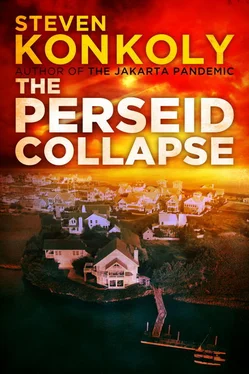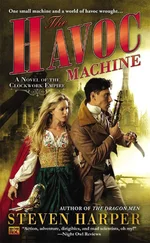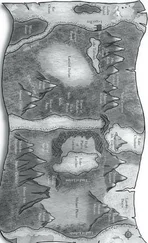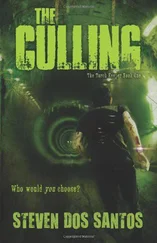“Hold on. Let me grab my stuff,” she said, relieved to see her daughter stop and force another smile.
At least she was trying.
EVENT +27:20 Hours
York, Maine
Alex felt the rumble strips pass under the Jeep’s tires, barely noticeable under a thin layer of sandy mud. Mud and debris had appeared on the turnpike a few miles past the abandoned Kennebunk rest stop, causing them to slow considerably and engage the Jeep’s four-wheel-drive system. Their planned forty-minute trip from the Maine Mall rally point had turned into an hour and a half. At one point Alex started to seriously doubt their ability to reach the York exit. The muck slowed them to ten miles per hour along the ten-mile stretch between Wells and York, where the turnpike passed a point two miles from the ocean.
Beyond the nearly impassible sludge, most of their trip had proven uneventful, yielding little insight into what had transpired the day before. Traffic had been light at five in the morning when the suspected EMP hit, leaving a sparse number of stranded motorists on either side of the six-lane highway. Most of the cars had managed to safely find the emergency lane; however, the occasional mid-highway obstacle kept them vigilant. They passed two single-car wrecks, stopping at both to check for bodies. They found none, which gave them the impression that state police still patrolled the roads.
The Jeep hit another set of rumble strips and slowed. Through binoculars, Alex saw a steeply curved wall of concrete barrier blocks diverting southbound traffic across the center divide, into the northbound lanes. A police cruiser sat at the end of the barrier. Two state troopers armed with shotguns stood on the driver side of the cruiser. Looking past the officers, Alex determined that concrete blocks were set between all of the northbound tollbooths, except for a single gap blocked by a state police cruiser. The purpose of the one gap became clear as the scene beyond the tollbooth unfolded.
“Shit. We aren’t getting through this. The entire southern side of the tollbooth is a parking lot. I see a few large tents—like a military command post or something,” said Alex.
“Both sides of the highway?” asked Charlie, from the back seat.
“Both sides, but that’s not the real problem. State troopers have the entire southbound lane blocked. Shit, I see a JLTV on the other side of the tollbooth.”
Charlie shot up in his seat, nearly knocking the binoculars out of Alex’s hands. Charlie was like an annoying child when anyone mentioned military hardware. His enthusiasm to share his vast knowledge often eclipsed any desire to hear what he had to say. Still, Alex would gladly take Charlie’s near encyclopedic recitation of information over Ed’s bare-bones knowledge of anything beyond the caliber and ammunition capacity of his Ruger 10/22 rifle.
“What kind?” uttered Charlie.
“Take a look,” he said, pushing Charlie’s face back with the binoculars.
“I’m pulling a U-turn,” said Ed.
“Hold on. Maybe there’s a way,” said Alex.
“Why take the chance? What if they have a description of our Jeep from the Best Western? We should double back to the Wells exit and take the back roads.”
“I’m with Ed on that,” said Charlie. “The less time they spend looking in our car, the better. I’m good with the back roads. By the way, that’s an AM General Bravo Blast Resistant Vehicle-Off road. Most likely Maine National Guard. Fifty cal mounted on top.”
Alex hadn’t considered the possibility that the police might have driven by the hotel within the past hour and stopped in the parking lot to investigate the commotion. He was certain that the angry crowd wouldn’t fairly represent his side of the story. Would the police be able to assess the scene and determine what really happened? Would they care enough to issue an APB? Did any of their radios work? They hadn’t picked up any local chatter on Alex’s police scanner, but most of the police departments had converted to encrypted P25 digital radio communications systems. Too many questions unanswered to take the chance.
If the troopers ordered them out of the Jeep, they’d have no choice but to disobey and speed north toward the Wells exit, praying that they weren’t worth the time and effort of a high-speed pursuit. Alex’s crew needed to do everything in their power to avoid a law enforcement confrontation. The Jeep couldn’t outrun the police, and they had hesitantly but unanimously agreed that harming police officers was out of the question. Alex wasn’t convinced that he could abide by that pact, especially if it jeopardized rescuing his son. Turning around before the tollbooth assured that he wouldn’t have to test these doubts.
“All right, let’s get out of here,” he said.
The rear passenger-side/center seat combination directly behind Alex had been folded forward to give Charlie quick access to their rifles and tactical vests, which were hidden underneath a thick plaid comforter. Three black school-sized backpacks lay over the comforter next to Charlie, camouflaging its purpose. The lighter, off-the-shelf daypacks had been stuffed with food, water, medical supplies and emergency basics to last twenty-four hours. Sufficient for their excursion into Boston, but not enough to weigh them down like the heavier packs.
They would hide the sixty-pound, long-term endurance rucksacks in the forest, wherever they decided to leave the Jeep. If the Jeep disappeared while they were in the city, the success of their return voyage to Maine would depend on the rucksacks, especially if the kids were in bad shape. The larger packs were stuffed behind Charlie’s seat, on top of a few duffel bags filled with each family’s memorabilia. Gas containers, several two-gallon jugs of water and a box of MREs filled the remaining gaps in the rear compartment.
They could have fit twice as much gear into the Jeep, but for tactical reasons, they packed lightly. Alex wanted clear fields of vision in every direction and quick access to their equipment, which prevented them from filling every conceivable nook throughout the Jeep with repetitive gear. He also wanted to configure the Jeep’s load-out for the possibility of an immediate and irreversible abandonment of the vehicle while under fire. If an overwhelming threat engaged their vehicle, they needed to be in the forest or bushes with their weapons, tactical gear and MOLLE packs in less than fifteen seconds. His combat experience had irrevocably proven that quickly abandoning your vehicle and finding suitable cover, when the situation dictated, bettered your chance of survival. The Iraqi Fedayeen he’d encountered on the way to Bagdad in 2003 never adequately grasped that concept. They’d died in droves, clustered around their disabled vehicles. He had no intention of letting that happen to them.
Ed slowly turned the Jeep left and guided the vehicle through the orange traffic drums separating the two sides of the highway on the approach to the tollbooth. Alex watched the police vehicles with anticipation as they entered the northbound lanes and accelerated away from the massive roadblock. The only vehicle that followed them was a maroon pickup truck released through the checkpoint, which passed them at high speed less than a minute into their detour and disappeared ahead of them. Alex wondered if the pickup could navigate through the mud ahead.
“I don’t see anything following us,” said Charlie.
“Good. Let’s try to sort out a route to the border before we hit the Wells exit,” said Alex, reaching between the front seats to open a spiraled map book.
“We’ll have plenty of time with the fucking mud,” muttered Ed.
“Route 9 to Route 4 takes us through North and South Berwick to the border—then to Dover, New Hampshire,” said Charlie.
Читать дальше












